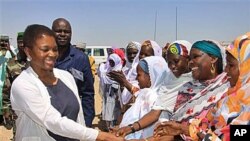The United Nations is appealing for $7.4 billion to provide urgent humanitarian aid to 50 million people in 28 countries. The appeal is for the West Africa region and 13 countries, which include 10 African countries as well as Afghanistan, Haiti and the Occupied Palestinian territory.
This year has been a disaster by any measure. The impact of multiple humanitarian crises, which include two mega-disasters -- the earthquake in Haiti and flooding in Pakistan -- are predicted to continue throughout the coming year.
This is the largest United Nations appeal ever launched, targeting the largest number of beneficiaries. U.N. Under-Secretary-General for Humanitarian Affairs, Valerie Amos, says the appeal reflects the scale, depth, frequency and complexity of crises situations around the world.
She says people are particularly vulnerable, that global economic crisis has weakened their ability to withstand shock, that food and fuel prices are well above historical averages and the global recession has hit trade, affecting even the poorest people.
"This year showed how easily a deeply vulnerable region like the Sahel can fall into acute crisis," Amos said. "And, we saw that in Niger and Western Chad most dramatically. Conflict is still a dominant feature in the lives of many of the people in the countries in this appeal. The abuse of civilians by armed groups continues in the Central African Republic, Eastern Democratic Republic of the Congo, Sudan's Darfur region and Somalia. We have continuing conflict in Afghanistan."
Amos notes the largest amount of the appeal, $1.7 billion, goes for aid operations in Sudan. She says this reflects the complexity and number of emergencies in that country.
"In terms of our planning, there are two different elements to it," she said. "One is what we identify as the needs in Sudan next year, regardless of the outcome of the referendum. And, second is the contingency planning we have put in place bearing in mind the possibilities of large-scale movements of people, the possibility of renewed conflict, particularly in the border areas."
Amos says humanitarian needs have eased slightly in some protracted crises. She notes there is better food security in parts of Somalia following adequate rains and harvests.
She says Niger's food and nutrition crisis has lessened since its acute peak earlier in the year. But, she is quick to add the food crisis remains alarmingly large and severe.
She says food security also has improved somewhat in Zimbabwe, though these three African countries still require a large-scale and urgent response.
UN Appeals For $7.4 Billion in Urgent Humanitarian Care
- By Lisa Schlein




